Arun Kumar Subedi is a political analyst and commentator. He was active in the democratic movement against the autocratic Panchayat regime and he is also a founder of the student politics in Nepal student union (NSU), the student’s wing of the Nepal Congress party.
He has several publications, some of it include Maya Tatha Leela (Manifestation and Dynamism): A book on comparative studies on the quantum paradigm and Vedanta, Sapana Kaa Gathaaharu (Anthology of dream): A book on development modeling of Nepal, Jal Sapana (Dream on Water): A book on integrated utilization of Nepalese rivers in connection with BBIN states and rivers linking proposal of Himalayan Rivers in India, Nepal and Bhutan and Swapnayatra (Dreamed Travel): A futuristic development fiction covering the geography of Nepal and its vicinity.
Dr. Pramod Jaiswal, Strategic Affairs Editor at Khabarhub, spoke to Arun Kumar Subedi on the Foreign Policy challenges of Sher Bahadur Deuba government and other contemporary issues.
What are the major foreign policy challenges that Nepal is going to face in the coming days?
We are facing the same challenges from the time of BP Koirala. Still, we have not changed our fundamental doctrine of foreign policy.
We are swinging between two doctrines; first, given by BP Koirala and second by late King Mahendra. When we feel uncomfortable with India, we remember King Mahendra and we start to play the doctrine of the card of relative benefit. Sometimes, when particularly, the Nepali Congress Party feels some pressure from the vicinity, Nepali Congress also adheres to the foreign policy based on BP Koirala’s doctrine.
The doctrine basically believes in being the strategic allies with third power to balance immediate neighbors which is, of course, the USA.
We have been swinging between these two doctrines, but now the world order is largely changing and we are yet to change our philosophy of foreign relations.
Still, we are in what we call the dogmatic phase. So, we have to be pragmatic, during the time of BP Koirala and King Mahendra, there were not many factors to determine foreign policy, and right now, we have lots of factors to consider; such as our diasporic interest, economic interests, which is also the center of our diplomacy and the global polarization.
At present, our foreign policy and diplomacy are based on what we call street class populism, and emotionally appealing to the people for votes, so that the party could win the votes in the election. To formulate foreign policy, and the issue of electoral policy is really a catastrophic thing for the nation.
The political parties in Nepal, mainly Marxist parties are doing these kinds of things, which ultimately have impacted our development, our foreign relations, relation with donors and in all aspects of society.
Do you think that the domestic politics of Nepal overshadow the foreign policy objectives of the country? Do we lack a well-articulated foreign policy and an effective mechanism?
Definitely. When it comes to the slogan of domestic politics, our so-called nationalism has been used as a tool from the era of the Panchayat.
Even in a democracy, our domestic politics and our doctrine of nationalism are based on an anti-Indian nationalism slogan, which is not going to work. Our geography and economic interest don’t permit it, but we are making it a factor in our domestic politics.
Ultimately, we are facing problems and chaos. We are not capable enough to settle the dispute with India through diplomacy. In fact, our philosophy of diplomacy is doldrum diplomacy, not quite a diplomacy.
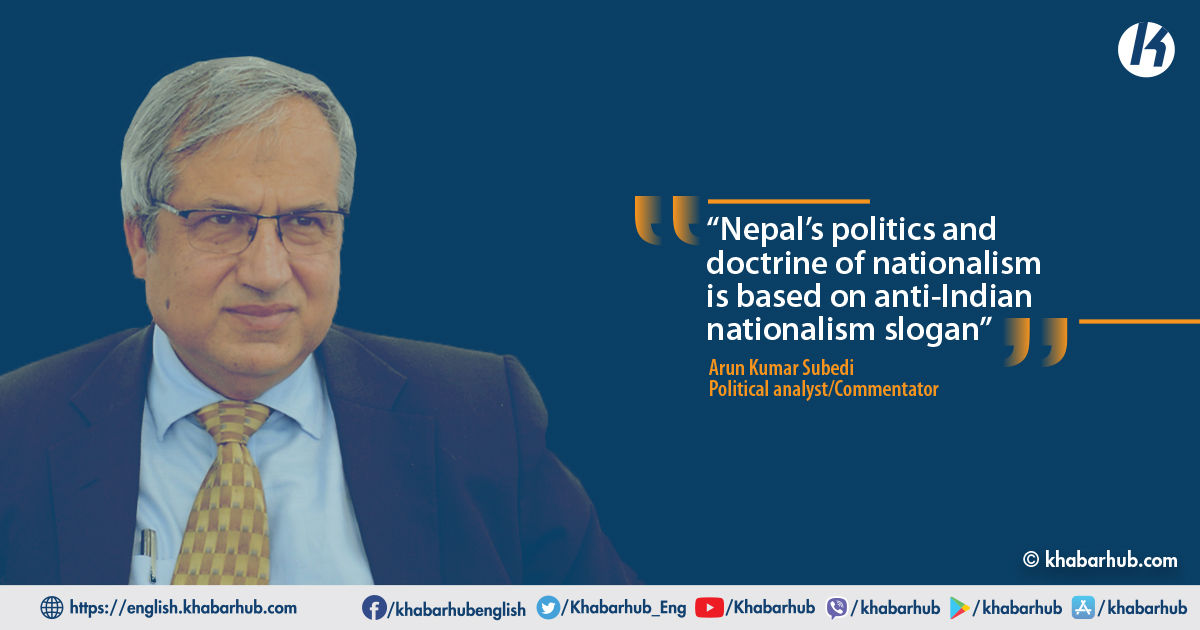
Where does Nepal’s relation stand with its neighbors India and China at the moment? How do you view Nepal’s delicate balancing act between India and China?
Balancing our neighbors, either they are geographic or sky is to be based on national interest; our economic, diasporic, natural geography, cultural interest and interest of our peoples.
In this nexus, we are having a broader spectrum relation with India, in comparison to China, because of our geography, economy and culture. We share the same cultural and natural geographic features with India.
So, the equidistance or balanced foreign policy means, it is to be proportionate with our interest. Since, we are having more interest, obligation and engagement with India, the relationship with India is more effective and pragmatic than China.
The relation with China is also equally important, but if we see the geography of Tibet, throughout the utilization of Chinese ports, the road, instead of India to connect with the sea, is only theoretical in motion, practically, it cannot happen.
I have been saying for a long time, we have already signed a transit agreement, but it has not been implemented yet, why? The natural geography and economic realities do not change with emotion.
We have to accommodate our emotions with economic and geographic realities, but in Nepal, it is not happening yet, it is our tragedy.
Particularly, the Marxist peoples are cultivating emotional issues in peoples. So, balancing India and China means balancing on the basis of our interests. Our diasporic interest is with West Europe, the US, Japan, South Korea, Australia, as we have been exporting our laborers and have labor relations with these countries, which are also allies with the US. In the broader spectrum relations should be maintained according to these interests.
But in the case of China, we are having two relations, first, we have been seeking investment from China. Second, we want a small market in China, as we are not exporting many goods to China and we cannot be dependent on transit with China.
So, relations with China should be based on these pragmatic factors rather than emotions. This exact balancing foreign policy, the concept of equidistance, or nonalignment is all bogus at present.
All these are theoretical hypocrisy, not anymore, we have to align according to our interests, and maintain the distance on the basis of power interest.
It needs to be the doctrine of our foreign policy. However, still in our institutional memory as well as the manifestos of political parties, we can see those hypocritic words such as equidistance and non-alignment.
Nepal is rich in water resources, but it has failed to utilize it. What are the reasons behind it? How can we make the best of this with the support of neighboring countries?
First, the case of sharing of water resources with our neighbor is Koshi dam, but it has been disputed from the very beginning.
Then came the Gandak, integrated Mahakali treaty, though there was more or less consensus in parliament, yet it has not been implemented.
Being an upper riparian country, our natural partners for harnessing water resources are India and Bangladesh. But until now, as per my expertise, we have not made a concrete philosophy to share and harness our water resources with respect to our neighbors.
If we look into the Koshi Dam, which I have been advocating for, that project can be a game-changer for Nepal. This will be the only project through which we will be able to connect ourselves with the ocean through the Eastern canal.
While advocating for Koshi high dams, I have been facing the blame of being an Indian agent or agent of RAW [Research and Analysis Wing].
I have been time and again advocating for a run of river diversion from water-prone areas to water deficit areas like Kaligandaki diversion, Sunkoshi diversion, Sunkoshi marine diversion, or Sunkoshi Kamala diversion.
There are only two types of projects in the river, one is, run of river diversion and another is storage. Making storage is also serving India, and running of river diversion is also serving India, then what is our philosophy to harness our water resources?
We have not settled on it yet. Because of global warming, the rainy season flow of rivers flash floods have been rampant for a decade. What is the philosophy of getting rid of these catastrophes?
Flood and in the winter season, extraordinary depletion and flow of rivers. First, government and political parties have to make a concrete philosophy on how to utilize the water and what sort of upper and lower riparian relation we want, so we can negotiate with India and Bangladesh.
Until now, we have no philosophy on it. We are having a tailor-made concept if India proposes any project, we oppose it. Without India, we cannot harness the water resources in that quantity we wish to. So, prosperity through water resources or harnessing the water resources lies within us.
How do you evaluate the handling of foreign affairs by the previous Oli government?
If we are to evaluate Oli’s government policy, the first phase of the Oli government was anti-Indian, and little tilted towards China.
Because then KP Oli was ratified by people on the basis of a particular slogan, ‘anti-Indianism is nationalism’ and opposing blockade.
But later on, Oli realized, the real nationalism is not anti-India but to manage India. So, he started to manage India. But his inclination towards India, or his philosophy of managing India, brought him out of the chair.
The first part of Oli’s foreign policy was reactive, but in the second phase of Oli’s government foreign policy was a little pragmatic but was not implemented.
How is Deuba’s foreign policy going to be different from the former KP Oli government?
It’s too early to comment on this issue as he still hasn’t appointed his foreign affairs advisor and the foreign minister. There was a tweet after Deuba took over the office that was traditional.
Let us wait, because there are two main factors we have to watch carefully that will tell us about the nuances of his foreign policy.
One issue will be his stance in handling MCC and another is how to maintain India. Right now, India is indicating a cold gesture towards the Deuba Government. It is the responsibility of Deuba to convert it into a warm gesture.
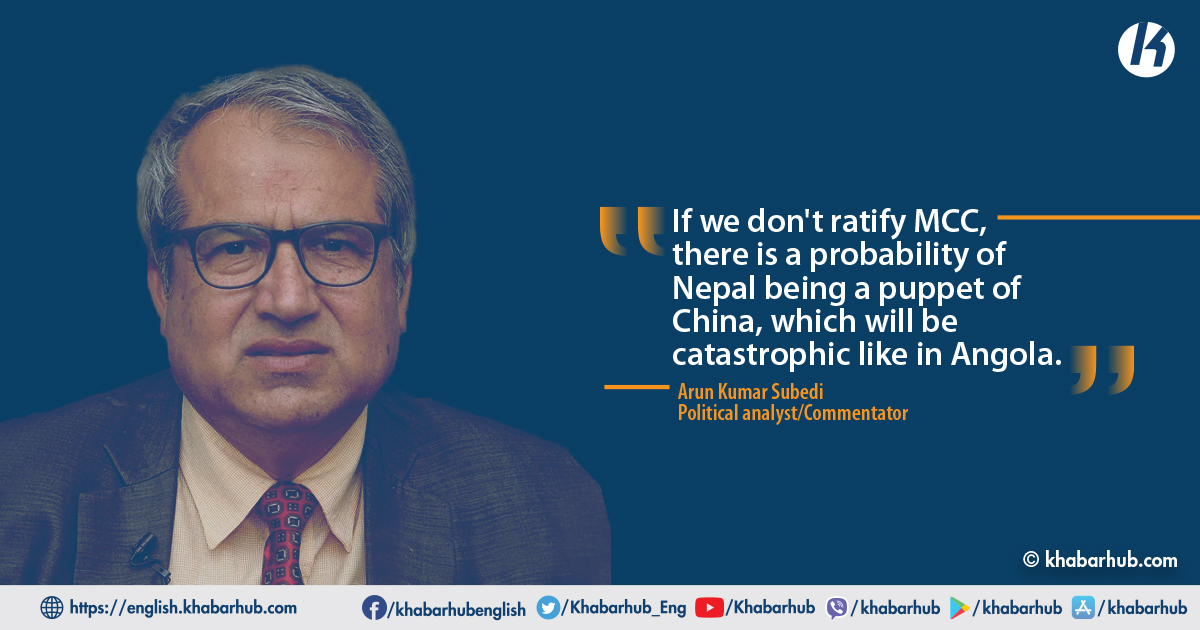
What are the major challenges for the current Deuba government when it comes to the foreign policy of Nepal?
The first challenge is to manage India, the second is to manage MCC and the third is to manage relations with China. Managing India is related to a number of issues
Why has Nepal failed to endorse Millennium Challenge Corporation (MCC)? What are your hopes for MCC and in what ways can Nepal achieve the best out of this project?
If we go through the compacts, there are no such clauses as propagated in the streets. I don’t know why even some learned people have propagated such rumors about MCC.
It is not a strategic agreement or compact. Of course, the Trump administration included it under the Indo-Pacific Strategy.
But the Indo-Pacific Strategy itself includes multiple aspects, not only military aspects. It is categorically written, the aid under MCC cannot be utilized for military purposes, but some people and media are propagating the rumors. But I can’t understand why such rumors are being so popular in the streets.
But one thing is for sure, if we won’t be able to ratify the MCC, it will affect relations with other donor communities, like IMF, World Bank, and even with western countries like South Korea and Japan. I have been casting doubt that some global power may be lobbying to cancel the MCC in Nepal.
If the MCC won’t be ratified, there will be only one way out for us, i.e. to be the next Angola. And in such a condition, we will have only one donor country and that will be China. If we don’t ratify MCC, there is a probability of Nepal being a puppet of China, which will be catastrophic like in Angola.
You said that MCC is not a strategic agreement and Nepal will be Angola if Nepal does not endorse MCC. If that is the case, then who is behind the protest against MCC?
There are two types of groups and people we can usually notice in the street and media; the first type is the far-rightist who always support the sovereign monarchy and oppose democracy.
Their protest is possible just because of democracy, as one of the mandatory clauses in the compact is – Nepal must respect democracy and fundamental human rights.
And another type seems to be the crowd gathered by some hitmen. I call them hitmen of some global power because those people always object to the democratic communities of the world, they have been blaming USA, Japan, West Europe and India.
However, they don’t speak a single word against North Korea and the Kim family or never comment anything against such a demonic regime.
See the recent development in China, President Xi amended the constitution and made a provision to be a dictator, as per the amendment he can be the President of China throughout his life.
I don’t know what is Xi’s philosophy, but it will now be taught starting from Kindergarten to University. These groups never comment anything on China or Venezuela but have problems with the USA, India and all the democratic societies of the world.
Certainly, they are the hitmen of the autocratic and Marxist regimes of the world. Ultimately it is being led by China, so these two communities are opposing MCC on the street.
But I wonder why the democratic community of Nepal is not advocating for the democratic communities of the world.
They are being so defensive and political speaking they seem to be in a depression syndrome. The democratic communities of Nepal must come forward and must defend the democratic communities of the world and must oppose and expose such hitmen.
But why are there increasing protests against MCC in Nepal? How can they convince the common people to protest against it?
Rumors are always popular than reality and truth. Thus, the propagation of Marxist philosophy in Nepali society is based on such rumors and subversions.
If you see the votes of the last general elections, the Marxist votes and workers are more than the democratic voters and workers in Nepali society.
So, the Marxist and the communists are against it. There is another additional force though it is an external force, the far-rightist or the supporter of the sovereign monarchy, they are definitely creating several subversions and creating emotion in people through the subversion. But the democratic communities are not defending which is why it is being popular in the streets.
Is China behind the scenes against MCC? If yes, why?
I don’t have any concrete evidence, but those people who are against MCC are supporting China, China’s policy, North Korean policy, and the Venezuelan ruling system. So indirectly it is a clear gesture that China is behind it.
As you mentioned China as the third challenge for the Deuba govt, why has Nepal not been able to achieve much out of the BRI even though it’s been years since the agreement?
It’s a very good question because each and every project is to be decided on the basis of economic and financial analysis. If financial and economic indicators permit, the project will be implemented, otherwise, not.
If financial and economic indicators provide a negative indication or some donor country insists on implementing such projects or some of the intellectual or opinion-maker advocates to implement such project, then that will be strategic only.
I suppose you are indicating the rail link from Lhasa to Kathmandu through BRI. So, on the basis of economic and financial indicators, the rail link from Lhasa to Kathmandu is not feasible, because Nepal is only a market of 30 million people. How many passengers will use the railway to visit China?
How many Chinese tourists will come to Nepal from China? How much cargo will Nepal consume? What are exporting items of Nepal to China? If we evaluate on the basis of all these factors, all the economic and financial indicators will be on the negative side.
So, the real experts think in such a manner. There are plenty of real experts in the government machinery, however, some are what we call the experts with prejudice who are influenced by external forces and are advocating such strategic projects.
You can extract some sense by comparing MCC and two airport projects: Pokhara airport and Lumbini airport. The financial and economic indicators of these airports are on the negative side, the Lumbini airport won’t be able to pay the loan in 50 years, or 100 years and the same thing is with the Pokhara airport, but no one is questioning those projects, why?
Because, tenders were given to someone from some special country that they love, but in MCC, there aren’t such clauses, which have been propagated in the streets.
MCC has great economic impact, and it will open the doorway for investment of a thousand billion of Nepali rupees’ or more. Nepal, thus, is in a serious state. As such influential and implanted people are opposing the MCC.


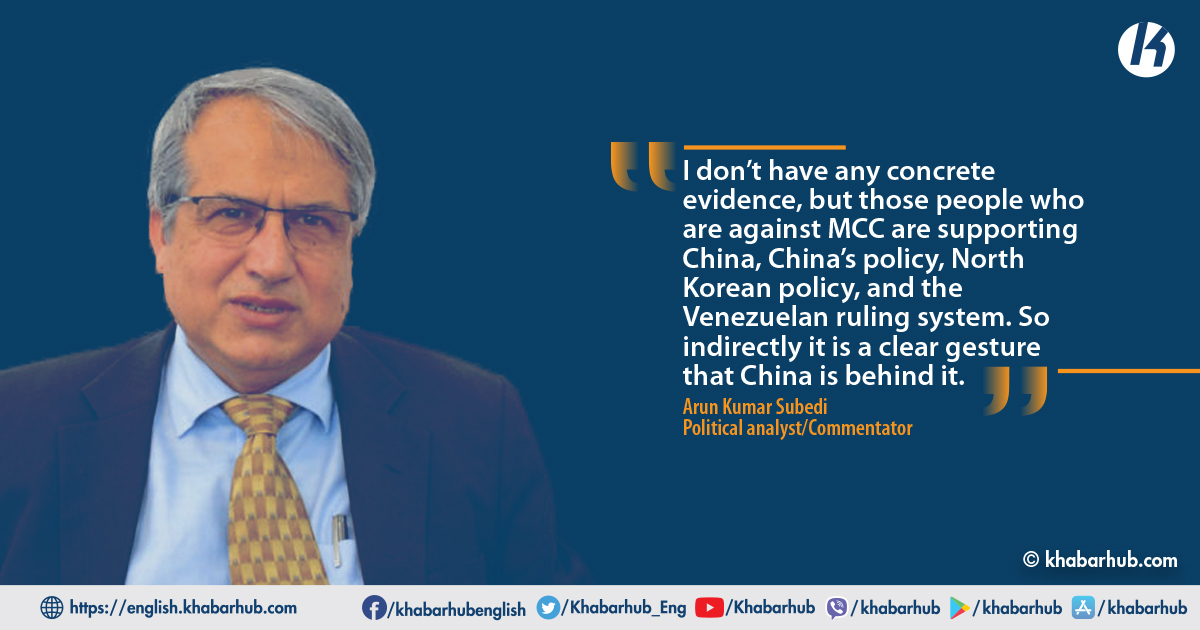

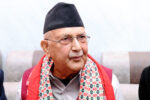
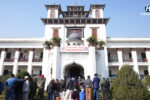



Comment